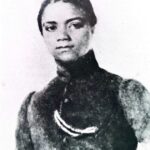BAYO, SARA
- 3 Min Read
Sara Bayo (circa late 19th-early 20th century) was chief of Katimbo in northern Sierra Leone at the time of invasions by the Sofa, warriors of the conquering Mandinka emperor, Samori Touré. By a lucky stroke of fortune, his territories were spared the worst of the invaders’ attacks.
He was born at Katimbo, in the Kasunko chiefdom, in present day Koinadugu district – an important town in territory which later belonged to a long line of chiefs who traced their roots to Futa Jallon, in what is now the Republic of Guinea. His father, Bayo Seri, in accordance with the custom of ruling families in northern Sierra Leone sent his son to Timbo in Guinea, then regarded as an important training ground for future chiefs. He may have acquired some Koranic learning there.
When he reached manhood, Sara Bayo returned to Katimbo and became chief in succession to his father, who died shortly after his return. In the 1880s, Samori Touré’s warriors swept down on northern Sierra Leone and Sara Bayo’s chiefdom was one of those affected. But like many northern chiefs, he considered it unwise to attempt any military confrontation with the more powerful Safo. Instead he and his people took refuge at Kamiliki, in Koinadugu district, an earlier settlement long since eclipsed by towns like Katimbo and Fadugu, also in Koinadugu. There, safely hidden in caves, Sara Bayo and his elders sent scouts to spy on the movement of the invaders. When their reports seemed favourable enough, Sara Bayo and his people returned to their chiefdom.
The invaders were now stationed at the town of Fadugu, where Sara Bayo, accompanied by two of his elders, met the Sofa war leader, Lankanfali, and in recognition of his military superiority, presented him with gifts – a bowl full of kola nuts, three slaves and three cows. Lankanfali accepted the gifts, but noticing that Sara Bayo’s fingers were twisted, declared that his troops had been forewarned not to make war on anybody with such a deformity.
With due reverence towards Sara Bayo and his subjects, Lankanfali had the gifts offered as a sacrifice. The Kola nuts were shared and everyone partook of the cow’s meat. The slaves were beheaded. Some of the invading forces stayed in the chiefdom even after Samori’s empire had been destroyed by the French in the mid-1890s.
The imposition of British rule followed the withdrawal of the Sofa forces from northern Sierra Leone, and Sara Bayo was recognised as paramount chief. Despite the fact that this put him on an equal footing with his pre-colonial overlord, Suluku of Bumban, Sara Bayo continued to refer certain matters to him.
He died in the early years of the 20th century and was succeeded by Lamina.
E. AMADU TURAY



